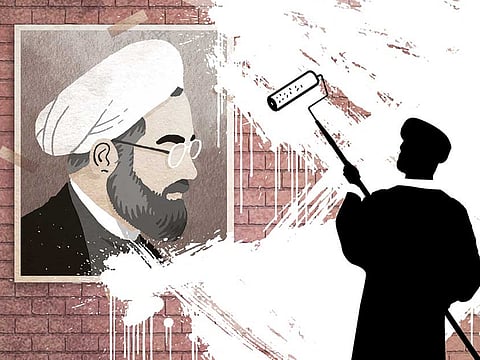In Iran a fierce conservative onslaught on the President
Raisi lobby wants to diminish Iranian president’s room for reform and thwart any likely run for supreme leader

Iran’s conservatives are mounting an effective counter-attack on President Hassan Rouhani after his successful re-election last month. They seem to want to neuter any post-election political momentum that Rouhani may want to muster to implement the economic reforms he has spoken of. The large margin of his first-round win proved his substantial public support, and the conservatives’ previous failures in parliament, city councils and then the presidency, indicated that they cannot muster enough political strength to win those parts of the Iranian power structure that are elected.
However, they have the backing of large sections of the conservative Iranian establishment, starting with the Supreme Leader, Ayatollah Ali Khamenei, and parts of Iran’s government that report directly to him, such as the Islamic Revolutionary Guards with their 120,000 personnel organised in ground, air and naval forces supported by the 90,000 strong paramilitary basij, backed by Sepah News to publicise their ideas. Unlike the Iranian Armed forces, which are charged with defending the state, the Islamic Guards are charged with defending the Islamic nature of the country from threats that include foreign interference and “deviant movements”.
The conservative establishment has its own reasons to diminish Rouhani’s standing because his defeated rival in the election was Ebrahim Raisi, Rouhani’s main opponent. Raisi was a senior judicial official and before the election was made the head of the wealthy foundation, Astan Quds Razavi, by the Supreme Leader. He was the conservative’s main candidate in the election, but more importantly, he may also be the conservatives’ candidate to succeed Khamenei, who is elderly and increasingly frail. Khamenei served as president before he took over as Supreme Leader after the death of the founding father of the revolution, Ruhollah Khomeini.
With this track record, a spell as president is seen as enhancing the chances of a candidate for the supreme position. So the results of the recent election harm Raisi’s chances to become supreme leader, just as they benefit Rouhani who may also make a run for the top job. Therefore the conservatives have mounted a frenetic campaign to damage Rouhani’s standing and create a political barrier that will stop him from advancing against the conservative bastions.
Iran analyst Sirous Amerian reports for the Atlantic Council that “recently, conservative and ultra conservative groups have been showing their anger and animosity towards Rouhani in different ways. On June 23, the last Friday of Ramadan, when the Iranian government marks Quds or Jerusalem Day in support of the Palestinians, some demonstrators in chants and slogans compared Rouhani to Iran’s first president, Abul Hassan Bani Sadr, who was impeached and later fled the country. Earlier, Khamenei had warned Rouhani not to divide the society into two camps as Bani Sadr did and appeared to authorise attacks on Rouhani supporters. Rouhani’s bodyguards had to help the president make a speedy getaway from angry Quds Day crowds”.
Religious credentials
Amerian adds that “a few days later, at Eid Al Fitr prayers, a religious poet took the stage and in a poem again insulted and made fun of Rouhani, Foreign Minister Javad Zarif and the nuclear agreement that Zarif had negotiated. The significance of this event is that, while some may argue that the demonstrators at the Quds Day demonstration were acting spontaneously, not everyone can go on stage before Eid Al Fitr prayers and read whatever they want”.
Amerian sees a link between the poet, Meysam Motiee, who is a graduate of Imam Sadegh University, a school whose students are carefully selected for their religious credentials and whose graduates include many Iranian politicians and other significant figures, such as former nuclear negotiator Saeed Jalili. Jalili was an unsuccessful candidate for the presidency in 2013 and is a major supporter of Raisi. The poet also supported Raisi and has connections with ultra-conservative circles and figures such as Alireza Panahian and Ahmad Allamolhoda.
Such barracking of significant political figures who do not meet conservative approval is common. Hardline pressure groups like the vigilante Ansar e Hezbollah have regularly been given licence to attack others for their beliefs, without fear of prosecution. These include Ali Motahari — an outspoken member of parliament and critic of the prolonged house-arrest of former presidential candidates Mir Hussain Mousavi and Mehdi Karroubi — who was attacked in March 2015 in Shiraz during a speech.
And others who have faced similar attacks are former parliament speaker Ali Akhbar Natiq Nouri, current speaker Ali Larijani, Hassan Khomeini, a grandson of Ayatollah Ruhollah Khomeini, and the late president Akbar Hashemi Rafsanjani.
Since the election, Rouhani has spoken out more freely and criticised the Islamic Revolutionary Guards, the IRIB, Iran’s state broadcaster, and other institutions that answer to the supreme leader. These powerful organisations have links with such vigilante groups, but if Rouhani does not interfere with organisations like the Guards, the Astan Quds Foundation or the state broadcaster, he is not likely to be in serious jeopardy. However, if he decides to try to diminish their roles, history shows that the counter-attack could be impeachment, like what Bani Sadr had faced.
Sign up for the Daily Briefing
Get the latest news and updates straight to your inbox



